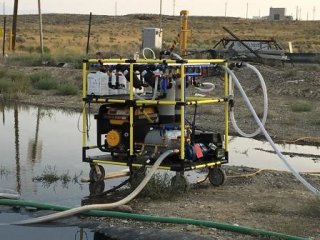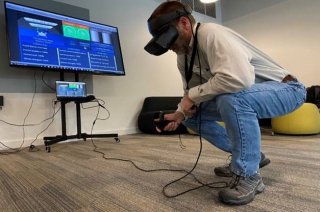EPA Research in North Carolina

EPA researchers are working hard to protect communities across the nation. Learn about some of the work EPA researchers are doing in North Carolina.
- PFAS in the Cape Fear River Basin
- Empowering Tomorrow's STEM Leaders in North Carolina
- EPA Hosts 13th Annual Summer Science Institute for North Carolina High School Students
- Making Miniature Models to Track Air Pollution
- Disposal of Contaminated Animals
- Providing Potable Water Following Disasters
- EPA Partners with Tribes to Deploy Air Sensors in Communities
- Designing a Virtual Reality Software to Prepare Responders for Sampling in a Hazardous Environment
- Helping Hospital Staff During the COVID-19 Public Health Emergency
- Siting New Trees in the City of Durham
- Helping Community Drinking Water Systems Find Cost-Effective Solutions to Treatment Challenges
For more EPA work, see EPA in North Carolina.
PFAS in the Cape Fear River Basin
The Office of Research and Development (ORD) has assisted with several per- and poly-fluoroalkyl substances (PFAS) research projects in the Cape Fear River Basin in North Carolina, including optimizing the operation of a full-scale PFAS treatment facility, mapping PFAS levels across the entire river basin, removing PFAS from community drinking water with granular activated carbon, and remediation of GenX and other compounds from a chemical production facility that borders the Cape Fear River. Having largely addressed PFAS wastewater discharge to river, attention has turned toward air emissions, fate, transport, deposition, and resulting land and surface water contamination down wind of the chemical plant.
Read the Science Matters Story
- EPA Researchers Use Novel Methods to Discover PFAS in Wildlife and Pets in Cape Fear River Region (2024)
-
EPA Researchers Use Innovative Approach to Find PFAS in the Environment (2018)
Empowering Tomorrow's STEM Leaders in North Carolina

For 20 years, ORD's Community Engagement & STEM Education Program (CE-STEM) has brought EPA science to classrooms and community spaces in central North Carolina. With the help of EPA employee volunteers, CE-STEM has reached over 385,000 students, educators and community members through outreach at K-12 schools, universities, community events and on the EPA-RTP campus. Read Empowering Tomorrow’s STEM Leaders: EPA’s Community Engagement & STEM Education Program Celebrates 20 Years.
EPA Hosts 13th Annual Summer Science Institute for North Carolina High School Students
In 2023, EPA hosted its 13th annual Summer Science Institute at the EPA Research Triangle Park campus in Durham, North Carolina. 28 students from 19 North Carolina high schools attended to learn about the wide variety of career paths at EPA and how EPA staff work to protect human health and the environment. Read EPA Hosts 13th Annual Summer Science Institute for North Carolina High School Students.
Making Miniature Models to Track Air Pollution

At ORD's meteorological wind tunnel facility in North Carolina, researchers use scaled models to simulate the spread of harmful airborne material released in urban and industrial settings. For 50 years, EPA researchers have studied air flow and dispersion in this unique lab, using scaled models to simulate the spread of harmful airborne material released in urban and industrial settings. Measuring how air flows around scaled model buildings and where pollution goes helps determine how exposure to pollutants affects public health. Learn more about this important work in Science Matters.
Disposal of Contaminated Animals
Agricultural emergencies, such as foreign animal disease outbreaks, could result in the need to dispose of many contaminated animal carcasses. ORD scientists, along with partners at other agencies and the state of North Carolina, built a prototype and evaluated how to use gasification to dispose of contaminated animal carcasses.
Providing Potable Water Following Disasters

ORD, in partnership with WaterStep, developed and patented the affordable and versatile Water-On-Wheels Mobile Emergency Water Treatment System (WOW Cart). Two WOW carts were deployed at locations in Western North Carolina following Hurricane Helene. A WOW Cart was first deployed by WaterStep near Asheville, North Carolina and treated 45,883 gallons of water. This volume is equivalent to 347K half liter bottles of water, or 184 pallets at a cost of $91,900 plus the nine flatbed trucks that would be needed to transport. This single deployment of the WOW Cart more than paid for the cost of the cart and significantly reduced solid waste and wear and tear on the narrow country roads from tanker trucks.
EPA Partners with Tribes to Deploy Air Sensors in Communities
Partnerships can advance participatory science efforts that use innovative approaches to protect communities from health risks such as air pollution. EPA worked with Tribal communities to deploy air sensors in a variety of venues, including on Tribal lands and at North Carolina Department of Environmental Quality's office in Raleigh, North Carolina to help people learn about air quality issues in their communities. Read EPA Partners with Tribes to Deploy Air Sensors in Communities.
Designing a Virtual Reality Software to Prepare Responders for Sampling in a Hazardous Environment

When it comes to preparing for environmental sampling after a biological incident, nothing beats hands-on experience. EPA researchers worked with the North Carolina Department of Public Safety and the City of Raleigh Fire Department to develop an alternative training solution for responders. The virtual reality software allows emergency responders to practice environmental sampling in a simulated real-world setting and get the firsthand experience needed to ensure they’re ready if disaster strikes. Read EPA Researchers Design Virtual Reality Software to Prepare Responders for Sampling in A Hazardous Environment.
Helping Hospital Staff During the COVID-19 Pandemic
In 2020, University of North Carolina Hospital staff faced a shortage of disposable N95 respirators during the COVID-19 pandemic. To adapt, they used a broad variety of face coverings, from improvised and homemade ones to mass-produced disposable or reusable masks. Since little guidance or information existed on the effectiveness of these face coverings, ORD researchers evaluated different types of face coverings to provide accurate, science-based recommendations to inform public health professionals on protecting themselves from infection during the pandemic.
Siting New Trees in the City of Durham
Nearly a century ago, the City of Durham, North Carolina went on a tree planting spree — but now the trees are approaching the end of their lifespans. As part of a new tree planting initiative, the city asked EPA researchers to develop a plan that would prioritize where to place trees to maximize the benefits the trees would provide to the community. Read Going Back to our Roots: EPA Researchers Help the City of Durham, North Carolina Site New Trees.
Helping Community Drinking Water Systems Find Cost-Effective Solutions to Treatment Challenges
Emerging contaminants, such as per- and polyfluoroalkyl substances (PFAS), are challenging to drinking water systems across the country. Effective treatment for emerging contaminants can be unknown, difficult, and extremely costly. Working with the state of North Carolina, EPA researchers are providing technical assistance to a large community water system with PFAS concerns to help them identify optimal, cost-effective treatment methods and optimize the long-term operation of their chosen technology. These efforts will also be used to develop best practices and performance and cost estimate tools so water utilities across the country can make informed treatment and operational choices. Read Technical Assistance for Treatment Options to Remove Emerging Contaminants.
